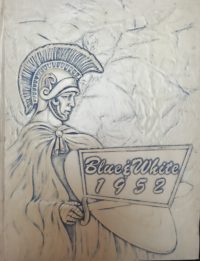Letters and More
Reflections on the Fifties: Los Angeles High School Reunion, Class of 1952, September 2017
 We would later hear ourselves described as the “silent generation” but it didn’t seem that way to us, not then, not now.
We would later hear ourselves described as the “silent generation” but it didn’t seem that way to us, not then, not now.
Sure, at UCLA in the early 1950’s, parking, and the food in the cafeteria, and beating USC were issues. But soon enough, by mid-decade, they had been overshadowed by challenges to a free student press, the role of student government, and the realities of race in the form of discriminatory clauses in campus organizations including fraternities and sororities.
Even at a bastion of academia and learning three thousand miles away, questions arose. What’s with the coats and ties? And the green shoulder bags filled, I was to discover, with books and notebooks but not lunch. But that was what the coats and ties were for, to satisfy a dress code to lunch at elitist, all-male eating clubs. This wasn’t UCLA, no T-shirts, jeans or twenty-five cent malts and burgers, and no book bags either. (But there was Elsie’s and its incomparable 50-cent roast beef sandwiches). Welcome to Harvard.
It was silent enough in the Grecian-like fortress of Widener Library, overflowing with centuries of scholarship and archives, with its neat little cubicles assigned to graduate students, isolating them among the stacks for research and writing. G-1, it said on my card, first-year graduate student. The start of a new life, in more ways than one.
Day One in Harvard Square, signing petitions to boycott Woolworth’s for refusing to serve black Americans at lunch counters, to protest the violent resistance to sit-ins and to the Freedom Riders. At the University of Alabama, and in Little Rock, Arkansas, the first signs of integration, even when it took a court order and federal troops to make it happen. The civil rights movement was underway—in the 1950’s.
In Moscow, a denunciation of a dead tyrant, Joseph Stalin, brought political upheaval in its wake. In eastern Europe—in Hungary, and Poland, and Czechoslovakia—uprisings against Soviet occupation. In Africa and North Africa—in Ghana and Algeria and Tunisia—rebellions against western colonialism. And in South Africa, against apartheid. In the 50’s. And another revolution of the 50’s: Rock n’Roll, foreshadowing a youth rebellion.
There would be more to come. In America, the women’s movement, the demand for voting rights, and a historic showdown in the streets of Selma, Alabama, and in the anti-Vietnam war movement. But that was in the nineteen-sixties. The opening-up of China, in the 70’s and onward, lay ahead.
Did we foresee all of this in the 50’s? No, of course not. But it was an unexpected blessing to be there for a lot of it, an eyewitness to history, to change, and the opportunity to confront and embrace the responsibility of a free press in a democratic society, not imagining even for a moment that we might be labeled “enemies of the people” in the politics of the future.
No doubt many of us experienced these momentous chapters in the life of our times, and no doubt many of us answered the call to take part and were proud to do so—to belong to that not so silent generation.
